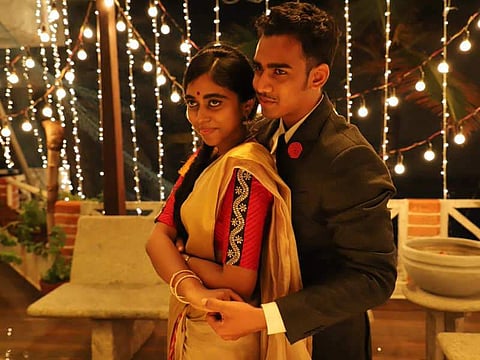

It is hard to miss the irony in the timing of House Owner's release, directed by Lakshmy Ramakrishnan. The film, set during the Chennai floods, comes as the city is on the brink of its worst water crisis. What's more, just days before the film's release, the city finally got a respite in the form of welcome rains after 200-odd days. But that's life for you. It throws extreme situations at us, so much so that if we look at the larger picture, the sheer contrast confounds us. House Owner narrates one such journey. The film has been called a ‘survival drama’, but it is actually a love story — Radha (Sriranjani) and Vasudevan’s (Kishore) journey.
Director: Lakshmy Ramakrishnan
Cast: Kishor, Sriranjani, Kishore DS, Lovelyn Chandrasekhar
Vasudevan is an Alzheimer’s patient. As the water level in their house increases during the flood, random pieces of furniture start to float around aimlessly — uprooted from their designated places. And it feels like a metaphor for what's going on inside Vasudevan's head — random memories drifting around in his consciousness. Vasudevan is a retired Army man, but his wife Radha is the soldier in the house as she battles his disease. She moves around with military precision — a rehearsed air that comes with routine. Unlike the early days of their relationship, when young Vasu (Pasanga Kishor) was the one on the lookout for her, it is now Radha who is in charge. Lakshmy gives us an idea of how instrumental Vasu has been in Radha’s transformation — the latter is now confident about her English, can play carrom, and in general, is not the meek, village belle she was anymore. The role reversal is quite charming.
Lakshmy also creates some really endearing moments. Like Vasu singing ‘Abhi naa jaao chodkar, yeh dil abhi bara nahi’, the first time he sees Radha. It isn’t usual for the groom to sing at a bride-seeing ceremony, but the moment works. Later, that is the only song he remembers. It’s almost as if his memory bears a candle only for that moment. However, not all small moments build up to gratifying pay-offs. While you get a real sense of who Radha is and what she transforms into, Vasu stays a mere outline. He is the kind of man who brings an extra flower for Radha’s granny, a widow, and urges her to keep it as she likes flowers. The kind of man who asks Radha for the shloka she chants for his well-being so that he can do it for her as well. The older Vasu, however, says things like “Pombanati a lakshanama adakkam odukkama irukanum.” While one can blame the Alzheimer’s for the rudeness (he doesn’t recognise her anymore,nor even himself), can a disease transform someone this drastically? Or is that what he has transformed into over the years?
The thing about love stories is that their effectiveness doesn’t depend on the novelty of the moment, but rather its intensity and depth. The film is titled after Radha’s nickname for Vasu, ‘House Owner’, but we don’t see her using it more than once. Vasu’s deep burning attachment for his house is only explained once, in a single sentence. And this just doesn’t seem enough. But we get constant exposition about other things. For example, just after a shot of water leaking into the house, we have someone exclaiming dramatically at it. A beautiful opening sequence painstakingly ‘shows’ his disease, only to have a voiceover explain the same. When this becomes a pattern, it gets tiring and also ruins the tension that has been created.
However, that does not take away from the robust performances of Sriranjani and Kishore. The former especially holds the screen with a tired resilience that is hard to ignore. Just like the Radha from mythology, patience fuels this woman’s strength and Sririanjani brings it out with the minutest of gestures — a sigh here, an eye-roll there. The younger couple, played by Lovelyn and Pasanga Kishore, take some time to warm up to their roles. There is a bit of awkwardness in their body language, especially when with each other, that makes their sequences feel a tad staged.
House Owner's filmmaking doesn't share the nuances its writing has. The colours of the frames in the two time periods seem to mimic the lives Radha and Vasu are living. The cinematography is perfunctory and the editing too obvious — you can sense the budgetary restriction with the former, especially in the Army portions. However, it is scored with some lovely music and the sound design is quite exquisite. After all, there's nothing more affecting than the lilt of the rain to the parched ear.
I wish the film had a different title, one more indicative of the love it talks about. I wish we could have seen more of the Radha and Vasu from before, not just the early days. but also the middle — moments that showed us something beyond the romance. Vasudevan, at one point, says they have to live every moment. Well, did they? Who were they truly before they got stuck with just memories? Maybe with these answers, the story of this house, and its owners, would have felt more complete.